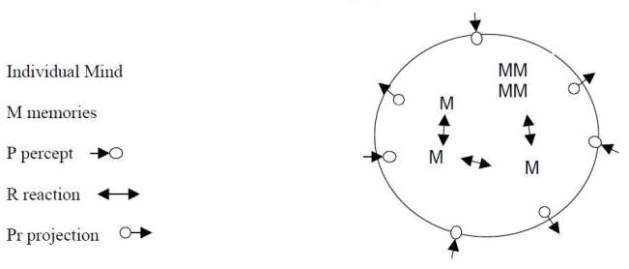Attributes of an individual mind
September 9, 2019 Leave a comment
We experience two minds: the individual mind and the unmanifested Mind-Stuff.
quotes from: The Mind, by Richard Rose, at: https://selfdefinition.org/rose/writings/richard-rose-the-mind.htm#attributes
I’m conscious of the individual mind. I wouldn’t say I’m conscious of “unmanifested Mind-Stuff.” Not offhand, anyway. Though he seems to think human minds can experience “unmanifested Mind-Stuff” or else actually do, just don’t really think about it as having a different source than the individual mind.
The individual mind is individual in appearance only, but we will call it that, when we refer to the mind of personal observation.
I am not sure why he says “appearance only” – it sure appears individual 🙂
There’s more on that individual/unmanifested distinction later, but first the article dives into what the individual mind is composed of.

This mind has four apparent qualities or attributes. Perception, Memory, Reaction, and Projection. All human actions are contained in these four. We perceive, we retain, and we project. We are like a camera that takes pictures, and projects pictures aided by Light.
Can I see these four attributes of my mind?
I’m listening to some music, “Happy Together” played on classical instruments at the library. I perceive the music. I also perceive the lyrics in my mind; imagine them anyway. That may be another of the four, probably projection.
I hear the violins and cello. I remember the recording and lyrics as the Beatles. I react somewhat without will to “hear” the lyrics in my imagination in a British-sounding voice. I react to this by trying to remember which Beatle sang it. I project their voices as well I can on the melody, trying to figure it out. (It turns out the song is by California band, the Turtles.)
This sounds similar to what the quartet played at the library:
Obviously, if the audio is working – if you know the audio is working – perception occurred. If it sounds familiar, memory occurred. If the mind tries to remember lyrics, it reacted. And if you can imagine the lyrics sung, maybe projection occurred.
So all four arguably are occurring, but are they the only four attributes of a mind acting in this scenario? Some potentially additional attributes can be considered combinations of these four. For example, Rose states:
The Reaction of memories upon memories is imagination.
When imagining the lyrics, is this so? Could it be so? I think this definition of imagination could be when imagining a song that doesn’t exist, sure. Well, in fact, since the Beatles cover doesn’t exist, to hear it maybe requires some interaction of memories upon memories. But if continuously incoming perceptions keep moving thoughts, it seems like imagining sung lyrics that line up with memory, doesn’t involve a second layer of memory. It’s not trying to imagine a new version, just replay a remembered version. Trying to imagine a Beatles version would have memory acting upon memory. (And I argue would sound the same 😉 )
So, many attributes of the individual mind can come from a combination of these four attributes. But what about individual willpower? Choice? Decisions?
Now you will immediately ask, “But do we not think? Or do we not will to do certain things?”
I’m going to will to check spelling and post this now.